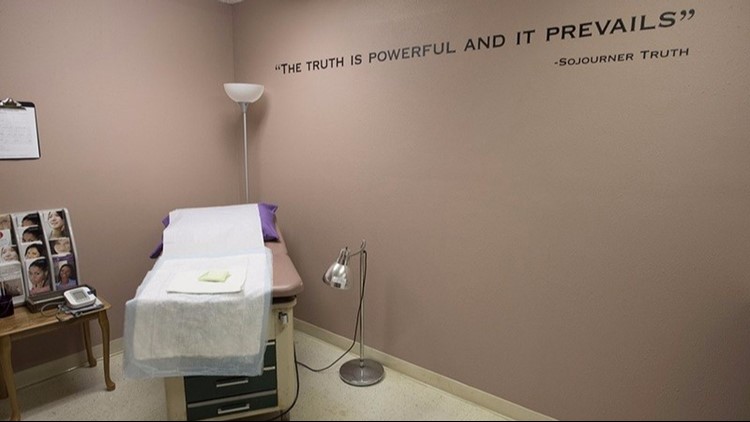SAN ANTONIO — A leading anti-abortion doctor has been appointed to Texas’ maternal mortality review committee. Dr. Ingrid Skop, an OB/GYN from San Antonio, will be serving in the role designated for a community member representing a rural area.
Skop is not just any anti-abortion doctor — she is the most visible face of a small but influential national anti-abortion medical community, the first call for anyone looking for an OB/GYN to publicly defend abortion restrictions.
Skop is one of the doctors who sued to revoke the U.S. Food and Drug Administration’s approval of mifepristone, a common abortion-inducing drug, a case that is currently before the U.S. Supreme Court. She is frequently called on to testify in favor of Texas’ abortion laws, including signing a sworn affidavit saying Kate Cox — a Dallas woman who asked a judge to allow her to terminate a nonviable pregnancy — did not qualify for an abortion under the state’s medical exception.
She has testified in front of Congress, authored amicus briefs and produced medical studies, some of which have recently been retracted, in her role as vice president and director of medical affairs for the Charlotte Lozier Institute, the research arm of the political advocacy group Susan B. Anthony Pro-Life America.
Now, on top of all of those other responsibilities, Skop is joining the state’s Maternal Mortality and Morbidity Review Committee, which reviews maternal deaths and near-misses, and offers recommendations to the Legislature on how to improve outcomes. Her appointment was first reported by the Houston Chronicle.
Skop’s appointment comes at a pivotal moment for the committee, as the state’s near-total ban on abortion has put a spotlight on the state’s staggeringly high maternal mortality rates, especially for Black women.
Skop said in a statement that she was joining the committee because these issues deserve “rigorous discourse.”
“There are complex reasons for these statistics, including chronic illnesses, poverty and difficulty obtaining prenatal care, and I have long been motivated to identify ways women’s care can be improved,” she said. “For over 30 years, I have advocated for both of my patients, a pregnant woman and her unborn child, and excellent medicine shouldn’t require I pit one against the other.”
Where have all the community members gone?
Texas’ maternal mortality review committee was created by legislation in 2013. It originally had 15 members appointed by the state health commissioner, a mix of obstetricians, midwives, psychiatrists, nurses and researchers.
It also had one community advocate spot, which had been filled by Nakeenya Wilson, an Austin-based maternal health advocate and community organizer. As a Black woman who nearly lost her life during childbirth, Wilson said a voice like hers was essential to have in the room while discussing these cases.
If, hypothetically, the committee was discussing how emergency rooms can better support pregnant and postpartum women, “the ER doctors have one perspective, the OB has a different perspective,” she said. “As does the community person. We may know things about how the community feels about the ER, or grassroots organizations that could come alongside the ER to help.”
Wilson was one of the people who was most outspoken after the state Department of State Health Services delayed publishing the 2022 maternal mortality report from its statutorily-required Sept. 1 deadline to late December.
During the 2023 legislative session, lawmakers passed a bill to expand the size of the committee, adding additional positions for specific medical specialties, including an oncologist, anesthesiologist and emergency room physician.
It also increased the number of community member roles to two, with one representing an urban area and one representing a rural area. But the law redefined the role, from “an advocate in a relevant field,” to “community members with experience in a relevant health care field, including a field involving the analysis of health care data.”
Although her term didn’t expire until 2027, the changes meant Wilson had to reapply for a spot on the committee. She was rejected.
Instead, the urban position went to Dr. Meenakshi Awasthi, a pediatric emergency medicine fellow at the University of Texas Health Science Center in Houston, and the rural position went to Skop, who practices in the state’s second-largest city.
“I have often cared for women traveling long distances from rural Texas maternity deserts, including women suffering complications from abortions,” Skop said in a statement. “I’m proud to continue advancing quality care for mothers so that no family must face the devastation of maternal death.”
Wilson, who advocated for the addition of a rural member, said she was disappointed the committee wouldn’t get the chance to hear from a community member who actually lives in a rural area.
“I thought they’d get someone from the Valley, or East Texas, or Amarillo, or Big Bend, not San Antonio,” she said.
The committee is now entirely made up of people who work in the healthcare field, with no community members represented.
Skop’s stances
With abortion nearly banned in Texas, many experts expect maternal mortality to increase.
Not Skop, though — she published an article on the Charlotte Lozier website listing 12 reasons maternal health and mortality may actually improve in states with abortion bans. The article claims fewer women will have mental health issues related to regretting an abortion, and points to evidence that having a child reduces a woman’s chances of later getting breast cancer.
Dismissing data from the U.S. Centers for Disease Control as too limited to be useful, she relied on studies from Finland and Denmark, and wrote that “dishonestly blaming state abortion limits as reasons for high maternal mortality, as some pro-abortion media have done, directs attention away from the true causes of the devastating problem of maternal mortality.”
The American College of Obstetricians and Gynecologists criticized Skop’s appointment, saying members of any maternal mortality review committee should be “unbiased, free of conflicts of interest and focused on the appropriate standards of care.”
“It is crucial that MMRC members be clinical experts whose work is informed by data, not ideology and bias,” the group said in a statement. “Abortion is inherently tied to maternal health. For some people facing maternal health complications, abortion can be lifesaving.”
The group also pointed to three abortion-related studies Skop co-authored with other Charlotte Lozier Institute researchers, which academic publisher Sage Journals retracted in February. According to the publisher, their expert reviewers “identified fundamental problems with the study design and methodology, unjustified or incorrect factual assumptions, material errors in the authors’ analysis of the data, and misleading presentations of the data that, in their opinions, demonstrate a lack of scientific rigor and invalidate the authors’ conclusions in whole or in part.”
In a statement, Skop called the retractions “meritless” and said the institute was pursuing legal action.
Skop has built her career on advancing anti-abortion views, testifying in favor of abortion bans at state legislatures, Congress and in courtrooms across the country. During a 2021 congressional hearing, she testified that rape or incest victims as young as 9 or 10 could potentially carry pregnancies to term.
She has repeatedly taken the stance that state abortion bans, like Texas’, are not to blame for the increasing number of reports from people who say they were denied medically necessary abortions. She instead blames doctors and the medical associations who advise them.
After Amanda Zurawski, a woman who is suing Texas after nearly dying as a result of being denied an abortion, shared her story with Congress in April 2023, U.S. Sen. Lindsey Graham asked Skop to weigh in on her case.
“I am so sorry for your loss,” Skop said to Zurawski. “And I am so sorry that your doctors misunderstood Texas law.”
“Dr. Skop is not my physician. She has never been my physician,” Zurawski said in response. “She has never treated me. She has not seen my medical records.”
Zurawski said cases like hers “will continue to happen and it is continuing to happen, and it’s not a result of misinterpretation. It’s the result of confusion and the confusion is because of the way the law is written.”
This article originally appeared in The Texas Tribune at https://www.texastribune.org/2024/05/22/texas-maternal-mortality-committee-ingrid-skop-abortion-doctor/.
The Texas Tribune is a member-supported, nonpartisan newsroom informing and engaging Texans on state politics and policy. Learn more at texastribune.org.



